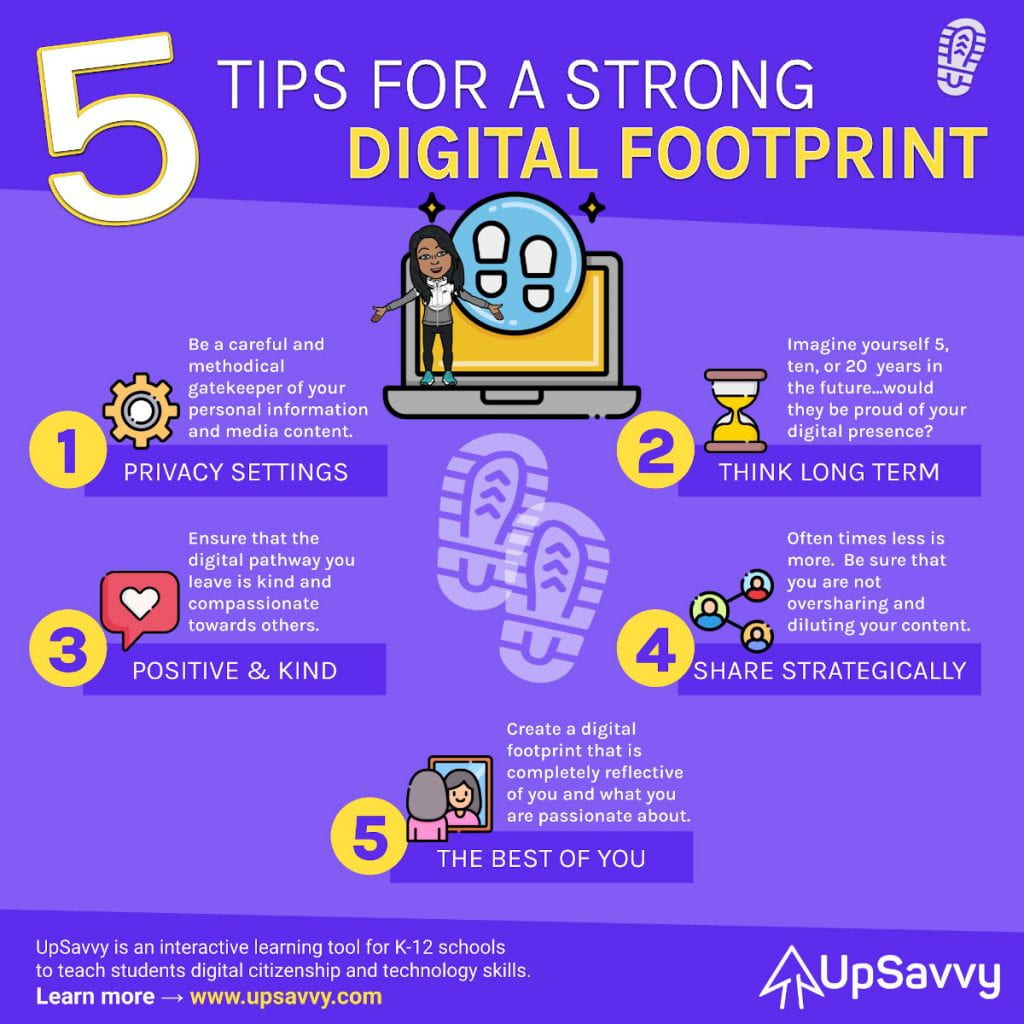It is only fitting that our last two debates were just as heated as the rest of them. I feel fortunate to have met all these passionate leaders in this class! I begin each section with my pre-debate thoughts. Next, I took the main points from the groups introductory video and rebuttal and formatted them into a list, then added comments made during the debate beside each debater. I finish each section with a reflection of the prompt and how the debate influenced my opinion.
Debate 7: Educators and schools have a responsibility to help their students develop a digital footprint

Before the debate I disagree with this statement. We should be allowing student’s choice in curating their own digital footprint to reflect their identity. I think educators have a responsibility to teach about digital footprints and digital citizenship, but not to develop it. I am glad I don’t have my digital footprint from when I was in school. We still need the right to forget.
Agree
- Parents, policy makers, and care givers are important, but teachers are better equipped to teach about digital citizenship
- Families need education and support in this work as well
- Building a foundation in a safe and controlled environment
- Digital technologies and 21st century skills are important in becoming citizens
- We must consider students developmental age
- Create a personal brand in a public space
- Rae: Teacher’s don’t need to upload photos of students. If it is portfolios or blogging, they only need selective
- Funmilola: Student mistakes are permanently online, if we are starting earlier they are digitally naïve, so we have the responsibility to present preventative strategies
Disagree
- Students digital footprint is already created by students and updated outside of school hours
- Teachers and schools are not prepared to support an evolving a digital world
- Risks displaying student information, data collection, and identity theft
- Inaccessible to many families
- Canadian law doesn’t differentiate between children and adults
- Kimberly Kipp: Students have digital footprints before they enter schools, by the time it is taught in school we are implementing a reactive approach. We need to address these issues systemically. Parents are signing these media release forms, but students are not. Online is not a safe space for students and we are exposing their identities in this unsafe space. We need consistent education.
- Gertrude: We can’t control their digital footprint or responsibly monitor student work. Code of ethics for online activities.
There was lots of debate about digital citizenship vs digital footprint in the chat during this prompt. There was also lots of debate about whose responsibility it is to build digital footprints. Many felt that there is a larger responsibility from government policies, curriculum, and companies that needs to occur. Students also need to give their own consent, not just the parents consent for autonomy. Placing another responsibility on teachers without building capacity will not be sufficient in keeping our students safe. Overall, this debate confirmed my bias. I still do not think educators should be responsible for developing student’s digital footprints, but I do think we have a responsibility to educate the effects of a digital footprint and how to become digital leaders.
Debate 8: Online education is detrimental to the social and academic development of children

Prior to the debate I strongly disagree. I do see potential impacts on physical health but by keeping student centered pedagogy in your course development there is equal opportunity for social and academic development of children. We do have to be additionally prepared to plan for social engagement and problem solving skills. Some student may even thrive in this setting because it takes away anxiety, there are multiple opportunities to demonstrate understanding, and greater possibility for accessibility.
Agree
- Additional costs to families
- Unable to provide equity to students
- At-risk students ‘vanishing’
- Negative effects of screen time
- classes aren’t true to their intention as they do not have access to materials (music, arts, PAA)
- Loss of authentic assessment
- loss of extra curricular
- No teacher supervision
- No division of home and school
- Physical schools offer access to food, clothing, and a safe space for students
- Colton: can online learning stand alone, not just supplement? There are a variety of levels of supports students may need.
- Britney: parents may take away from class time, and some may not have parent support. Social anxiety can continue online, and we can’t assess their mental well-being. Relationships are needed to connect with students.
- Kayla: K-4 curriculum is learned by play, inquiry, and social interactions that can’t be replicated online. It is not realistic for students to have independent work habits.
Disagree
- Flexible, accessible, inclusivity
- Cost saving
- Teaches time management skills
- Smaller class sizes and one-on-one support
- Student autonomy is increased as students can review as needed
- Virtual classroom is available anywhere
- Digital skills transfer to the workplace
- Customizable learning experiences
- Constructive and timely feedback
- Flexible schedules
- Christopher: the more options student’s have, if the option is there it can be chosen. It works best when presented as a choice, not like the pandemic.
- Arkin: has affordable options to meet their needs
- Katherine: Students who chose online can still attend in person activities. Pandemic teaching is better than no teaching in emergency situations. Parents can decide if their children are capable of independent work habits.
Maybe I’m stubborn this week, but I maintained the same position. I do side with the disagree team that digital learning needs to be presented as a choice, because it isn’t going to be a successful option for everyone to consider. Some families will need this flexibility to be successful (many of my previous virtual students had a variety of health needs), and some will need the in-person supports, some will need blended or hybrid. I think that it is important that online education is developed with planned opportunities for interaction, which may require a mindset shift on defining social development. The disagree side emphasized that online education doesn’t mean online extra curriculars, students still have access to community services and programs. The distinction of Emergency Remote Teaching and online education are vital to this debate as well. There may need to be some policy updates in the future surrounding online education to include attendance and welfare checks to make sure it is implemented with student safety and wellbeing in mind. I think the benefits of online education can’t be overlooked, and it is a great option for families to have!
Would online education work for your family?
Do you prefer online education as an adult?
What steps do you take to develop positive digital footprints for students?
Happy Teaching,
Leah


Hi Leah,
Great job breaking down our last two debates. I like that you’ve stubbornly stuck to your guns this week. HA! I wanted to answer some of the questions you left off with:
1. Would online education work for your family?
Last year my son (aged 6/7 then) was in online French with Saskatoon Public. Keep in mind that we do not speak a lick of French at home, but I was determined he would continue what he started in kindergarten. He did so well online. It truly shocked me! I am forever grateful for his teacher who made it a wonderful, interactive experience. As an online teacher though, I know online does not work for ALL children. It definitely appears to be a great alternative for SOME children. All that being said, we happily returned my son to in-person this year, where he is also thriving. It’s so nice to have options. Why call any style of learning “detrimental” if it can help SOME students?
Do you prefer online education as an adult?
I have to say, as an adult (who NOW has a reasonable amount of responsibility in my veins), I am loving online learning. HOWEVER, if this had been an option for me fresh out of high school? DISASTER! I lacked certain executive functioning skills that only would’ve diminished with online. So yes, I prefer it now but only because I’ve grown up a great deal!
What steps do you take to develop positive digital footprints for students? Honestly, I do the best I can to teach my students about digital CITIZENSHIP in the hopes that the footprints they create, largely outside of school hours, are equally positive. Even though I argued against eportfolios, I do actually think they are a great opportunity for students to create positive digital identites. Although…I am increasingly worried (after all the resource reading) about this information being leaked. We have a duty to our children to tread very cautiously online.
Thanks for the great questions!
Hi Leah,
I feel like an adult with a family, I love online education! It saves so much time and effort. As an adult with a family, experiencing campus life may not be the most important thing to do. I need to balance work, family and study, and online education perfectly fits my situation. This might be a different situation for students who just graduated from high school. Completely online education would be horrible for them. Since they cannot experience campus life and make friends with their peers. Great reflection question!
Echo